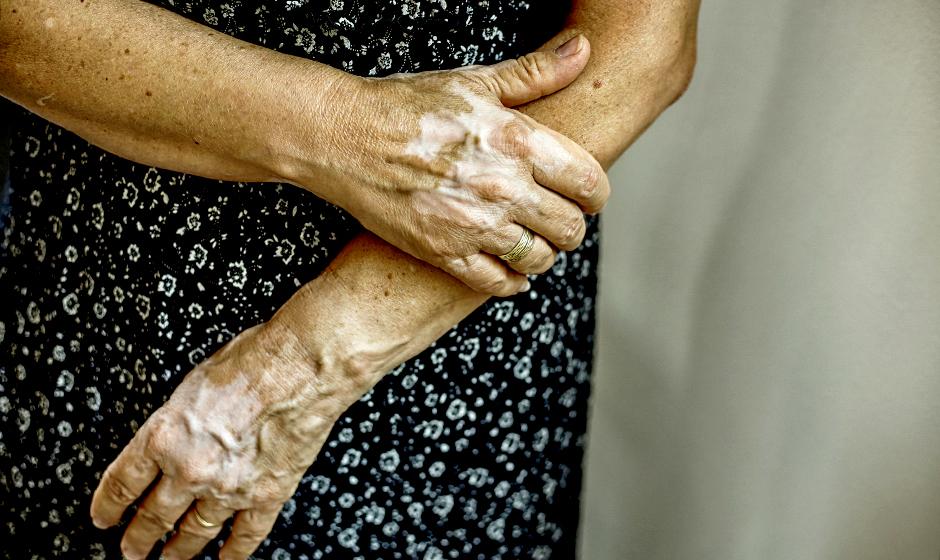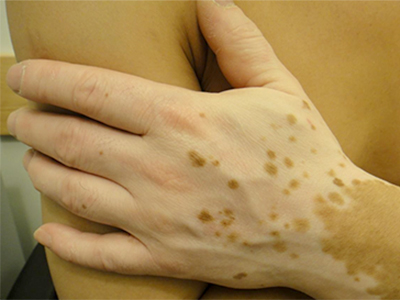
Our expert explains the challenges patients, researchers and clinicians have faced with the rare skin condition—vitiligo.
Visibly lighter patches of skin that often present symmetrically on the face and hands may well be a sign of a rare skin condition called vitiligo. Our Vancouver Coastal Health Research Institute expert, Dr. Youwen Zhou, explains its causes and highlights new research that could improve therapeutic outcomes.
Q: What causes patches of lighter skin on the body?
A: Common inflammatory conditions, such as eczema and psoriasis, are the most common causes of the transient lightening of skin colour. This causes what is called post-inflammatory hypopigmentation in which the border between affected and non-affected skin is often not clear-cut. Several other skin conditions also cause the loss of skin colour, such as pityriasis alba, guttate hypomelanosis, macular hypomelanosis and aging-associated leukoderma.

The exact causes of vitiligo are unknown. However, there is strong evidence pointing to the potential role of genetic factors, immune cells, a lack of protective factors inside the skin, melanocytes—melanin producing cells that affect skin pigmentation—self-destruction or environmental toxins. This is a subject of intense investigations worldwide
Q: Is vitiligo harmful to one’s health?
A: The condition does not affect longevity. However, it can have a huge impact on patients’ psychological well-being due to the visible patches of differently coloured skin, which is more pronounced among individuals with darker background skin tone. Psychological impacts can range from reduced self-confidence to depression.
Q: Who is most at risk of developing vitiligo and why?
A: Vitiligo affects around 0.5 per cent of the global population, and is found among all ages and genders to a similar extent. However, it is most visible among people of Asian, African and Southern European descent. The highest incidence is found in India, which may reflect a higher reporting rate. It is unknown if a genetic predisposition or environmental factors also play a role in variations of vitiligo prevalence.
Q: What are the current treatments for it? Are new treatments being developed?
A: While there is no curative treatment for vitiligo right now, narrow band ultraviolet B (UVB) phototherapy is increasingly used to suppress the immune system and stimulate melanocyte development. This treatment is typically delivered to patients two to three times per week over the course of months or years in order to regain pigmentation. However, only a small proportion of vitiligo-affected individuals successfully achieve repigmentation of the lost skin colour.
One focus of my research is to understand why some people respond better than others to UVB therapy. My team reported in the journal Frontiers in Immunology that vitiligo-affected individuals who start treatment soon after developing this condition, and whose depigmented skin contains biomarkers of active inflammation or immune reactions, are much likelier than others to achieve treatment success. My team proposes to develop a clinical test based on this discovery to help doctors provide clinical care to individuals with vitiligo.
Another focus of my research is developing improved therapies that are safe and effective for vitiligo. Based on my discovery of a lack of melanocyte protective factors among vitiligo patients, my team is developing a new vitiligo therapy that we hope to test in clinical trials in the near future.
Q: What resources are available to support people with vitiligo?
A: The best source of expert support for people with vitiligo is their dermatologist. The Global Vitiligo Foundation, Canadian Skin Patient Alliance and local vitiligo patient support groups are also valuable resources to get up-to-date and verified information.



